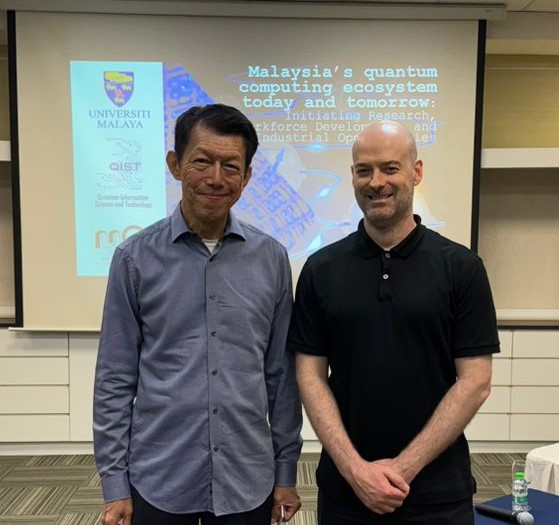Quantum technology is a cutting-edge field that harnesses the principles of quantum mechanics to revolutionize various aspects of our lives. One of the most promising applications of quantum technology is quantum computing, a powerful tool that can potentially solve complex problems far beyond the capabilities of traditional computers. In this article, we will delve deeper into the world of quantum technology and explore its flagship component, the quantum computer.
Peering into the Quantum Realm
Quantum technology refers to a diverse array of technologies that exploit the principles of quantum mechanics. Unlike classical physics, which describes the behavior of macroscopic objects, quantum mechanics delves into the behavior of matter and energy at the smallest scales, such as atoms and subatomic particles.
At the heart of quantum technology lie two fundamental phenomena: superposition and entanglement. Superposition allows quantum particles to exist in multiple states simultaneously, vastly expanding the range of possibilities for computation and information processing. Entanglement, on the other hand, connects particles in such a way that the state of one particle instantaneously influences the state of another, regardless of the distance between them. These unique properties form the basis of quantum technology’s extraordinary potential.
Understanding Quantum Mechanics
Quantum mechanics often presents mind-bending concepts, but at its core, it revolves around the idea of superposition and entanglement. These principles challenge our classical intuitions but underpin the behavior of matter at the quantum level. While classical physics remains effective in describing macroscopic phenomena, quantum mechanics provides a remarkably accurate model for understanding the behavior of particles at the smallest scales.
Quantum Computers: The Game-Changers of the Digital Age
Introduction to Quantum Computing
Quantum computing is a groundbreaking technology that utilizes quantum bits, or qubits, as its basic unit of information. Unlike classical bits, which can only represent either 0 or 1, qubits can exist in a superposition of both states simultaneously. This unique property enables quantum computers to perform exponentially faster calculations for certain problems compared to classical computers.
Quantum vs. Classical Computing
The key difference between quantum and classical computing lies in their approach to processing information. Classical computers process information sequentially, performing calculations one step at a time. Quantum computers, however, can explore multiple possibilities simultaneously, thanks to superposition and entanglement, making them ideally suited for solving complex problems more efficiently.
Challenges in Quantum Computing
As promising as quantum computing is, it faces significant challenges that must be overcome before its full potential can be realized. One of the most critical challenges is maintaining qubit stability and reducing error rates, as quantum systems are highly sensitive to their environment. Additionally, quantum computers are susceptible to decoherence, where quantum states become corrupted, leading to errors in computations. Researchers are diligently working on quantum error correction and fault-tolerant techniques to address these issues.
Real-World Applications of Quantum Technology
Quantum Cryptography
Quantum cryptography harnesses the principles of quantum mechanics to create ultra-secure communication networks. By employing quantum key distribution, it ensures that any attempt to intercept communication is instantly detected, providing unprecedented levels of data security.
Quantum Sensing and Imaging
Quantum sensors have the ability to detect minute changes in various physical quantities, such as magnetic fields, gravity, and time, with exceptional precision. These sensors hold tremendous potential in fields like medical diagnostics, geological surveys, and navigation systems.
Quantum Communication
Quantum communication enables secure transmission of information over long distances using quantum entanglement. This technology promises to transform global communication networks, ensuring confidential data remains safe from eavesdropping and hacking.
Quantum Simulation
Quantum simulation allows researchers to model and understand complex quantum systems that are difficult to study with classical computers. This capability is invaluable for advancing materials science, drug discovery, and solving quantum chemistry problems.
The Future of Quantum Technology
Quantum technology is still in its infancy, but the potential impact it can have on various industries is immense. As researchers and engineers make strides in quantum computing and other quantum technologies, we can expect to witness groundbreaking advancements in fields like medicine, finance, artificial intelligence, and climate modeling.
Conclusion
Quantum technology has arrived as a promising new frontier that will reshape our world in unimaginable ways. Quantum computing, with its unprecedented computational power, is set to solve problems previously deemed insurmountable. As quantum technology continues to advance, it will usher in a new era of technological innovation and transform industries across the globe. Embrace the quantum revolution and witness the exciting possibilities it holds for the future!
To be part of this quantum revolution, seize the opportunity to learn more about quantum technology at SEA Quantum Malaysia. Attend workshops, seminars, and interact with experts in the field. Embrace the future and stay at the forefront of technological innovation by engaging with quantum technology.







